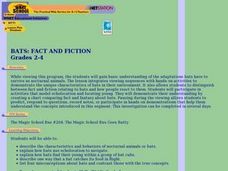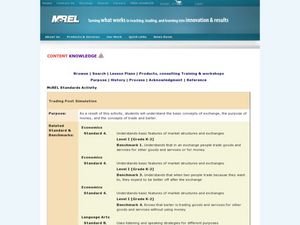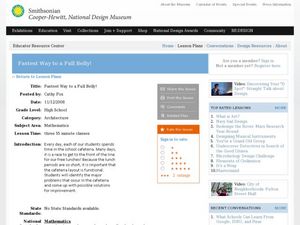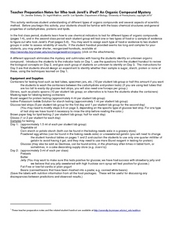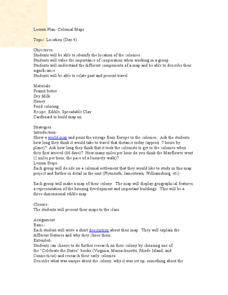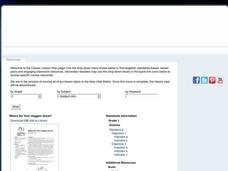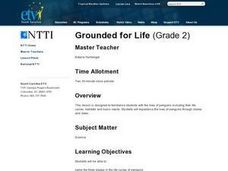Curated OER
Bats: Fact and Fiction
Students describe the characteristics and behaviors of bats. After viewing a video, they explain how bats use echolocation to navigate and how they find their young within a group. They list four misconceptions about the animal and...
Curated OER
Trading Post Simulation
Young scholars explore the concept of trade. In this trade lesson plan, students simulate a trade store. Young scholars are divided into two groups. Half the class runs the store, half the class are customers. Students try to trade goods...
Curated OER
How Can We Keep Our Forests Intact and Have Our Chocolate Too?
Fourth graders explore various methods of growing and harvesting rainforest foods in order to sustain its biodiversity. They discuss the various uses for trees from several viewpoints. Students research chocolate demand and land use...
Curated OER
Viruses, Bacteria, Protists, and Fungi
In this viruses, bacteria, protists, and fungi worksheet, students will review the basic characteristics of each of these groups. Students will complete 7 fill in the blank questions about viruses, 6 true or false questions about...
Curated OER
The Business of Design
Students visit the Design for the Other 90% exhibition. In this design lesson, student learn how to design for the population of the world that is poor or impoverished. In addition, students read New York Times articles and watch videos...
Curated OER
Fastest Way to a Full Belly
Students create a scale model of a cafeteria. In this scale lesson, groups improve their actual school cafeteria layout by taking measurements of the structure and redesigning furniture and food serving lines. They create a scale drawing...
Curated OER
Who Took Jerell's iPod?
High schoolers investigate various substances to determine the perpetrator of a crime. In this biology lesson, students test for the presence of organic compounds in various samples. They identify an unknown substance based on its...
Curated OER
Edible Plant Parts
Students participate in various activities to discover the six basic types of plants. In groups, they analzye the foods they eat and identify which part they consume. After reading "The Fablous Food Phantom", they create a food phantom...
Curated OER
Colonial Maps
Students discover the history of America by identifying the traditional colonies. In this U.S. history lesson plan, students examine a world map and identify where the voyagers left from Europe to arrive at the United States. ...
Curated OER
Where Do Your Veggies Grow?
First graders investigate the origins of vegetables. In this Science activity, 1st graders identify where fruits and vegetables come from. Students describe how people utilize plants.
Curated OER
Eating for Your Future
Students brainstorm ways to live healthy. In this health science lesson, students recipes that are healthy and appealing. They compile all recipes and develop a class cookbook.
Curated OER
Knowing your nutrients
Students comprehend the basics of the nutrition label. They comprehend the Recommended Daily Allowances. Students analyze the regulations that govern food labeling. They review the Food Pyramid.
Curated OER
Microwave Introduction
Sixth graders learn the principles of microwave cooking and how to use and care for it properly while preparing foods.
Curated OER
Design-A-Meal
Third graders record what they eat for a week. In groups, they develop a menu for a fictitious restaurant. They create dinners which include all groups from the food pyramid. To end the lesson, they practice making healthy food...
Curated OER
Family Life Cycle - Breakfast Lab
Pupils review the nutritional needs of various age groups. In groups, they plan a breakfast meal for different age groups and spend time making the foods. To end the instructional activity, they serve the food to their classmates for...
Curated OER
Staying Healthy Year Round
Students are read a variety of books and observe the weather in the different seasons. In groups, they compare and contrast the type of activities people are doing. They also discuss how they adapt to the changes in seasons by the...
Curated OER
House Bill No. 4097
Learners identify healthy and unhealthy foods while considering a bill that would ban certain foods in schools. Through survey and discussion, they discuss a proposed legislative bill that would ban certain types of food in schools....
Curated OER
The Needs of Living Things
Learners watch video clips of animals and plants in their natural environment, to gather evidence that all living things have basic survival needs. Students draw pictures of real or imaginary pets eating, drinking, breathing, and taking...
Curated OER
Natural Features as a Resource
Students research how people use land and water features to meet their basic needs. For this natural features lesson, students review land and water features. Students discuss how the land is used to meet needs using a landscape picture...
Curated OER
Colored Clouds
Fourth graders, in groups, examine how particles in warm water move faster than particles in cold water.
Curated OER
Milk and Dairy Test
Learners explore how to select and prepare milk and milk products, identify standard serving size for milk and milk products, review terms associated with milk and milk products, and demonstrate knowledge of how to use and care for these...
Curated OER
Introduction To Pests
Students investigate common pests and match pests to their respective pictures. In a group discussion, students explore the basic needs of pests and share personal pest stories. They examine common self-protection measures. Using the...
Curated OER
Toxicology 2: Finding the Toxic Dose
Learners brainstorm with group partners to decide upon a chemical they would like to test, and outline a procedure for their investigation. They then present in groups their ideas to the rest of the class as well as the chemical they...
Curated OER
Grounded for Life
Second graders become familiar with the lives of penguins including their life cycles, habitats and basic needs. Students will experience the lives of penguins through stories and video.
Other popular searches
- Five Basic Food Groups
- Four Basic Food Groups
- 4 Basic Food Groups
- 5 Basic Food Groups
- Basic Food Groups Free
- 3 Basic Food Groups
- Basic Food Groups Worksheets


